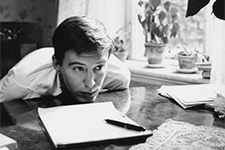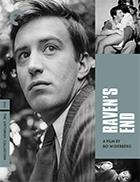Raven's End (Kvarteret Korpen)
|  Bo Widerberg’s second feature film, Raven’s End (Kvarteret Korpen), has much in common with his first film, The Baby Carriage (Barnvagnen), which was released earlier that same year. Both are stark dramas about working-class youth struggling to break free of the social and economic confines into which they were born. Both are set in the Swedish port city of Malmö, where Widerberg was born and grew up, and the neighborhoods within which the stories unfold are so similar that one can easily imagine them taking place at the same time just a few blocks apart. Both films involve inconvenient pregnancies, troubled relationships with flawed parents, and the omnipresence of disillusionment. However, Raven’s End differs in that it is set in 1936, rather than the then-present 1960s, which allows Widerberg to set his story against the historical backdrop of Sweden’s Social Democratic party trying to fend off incursions of Nazi politicians (there are numerous references to the Olympics taking place in Berlin that year, the height of Hitler’s international prominence prior to World War II). A committed, socially attuned artist who admired the work of the Italian neorealists and the fiercely independent films of John Cassavettes, Widerberg had been agitating for years for a new Swedish cinema, one that was free to explore the lived realities of the country’s working class with honesty and immediacy. Along with The Baby Carriage, Raven’s End was the realization of that commitment to a more socially relevant cinema, one that pulled no punches in dramatizing what the Italian neorealists had begun in the 1940s and other national cinema movements, including the French New Wave and Britain’s so-called “kitchen sink realism,” had continued in the ensuing decades. Raven’s End is a slightly more mature work than The Baby Carriage, which bore the weight of numerous New Wave aesthetic flourishes that felt forced; Raven’s End has a more consistent style that fits the grim rhythms of its narrative. It also helped to solidify Widerberg’s standing in the international film community, as it played at numerous major festivals, including Cannes, and was nominated for an Oscar for Best Foreign Language Film in 1965. The protagonist is Anders (Tommy Berggren), an aspiring author in his early twenties who lives at home with his mother (Emy Storm), who makes money doing other people’s laundry, and his father (Keve Hjelm), a charismatic alcoholic who struggles to maintain a job. Anders spends most of his free time writing stories based on his neighborhood (the film’s title references the Korpen district in Malmö where he lives), leaving little room for relationships, although he has a good friend in Sixten (Ingvar Hirdwall), who aspires to play professional soccer, and a sort-of girlfriend in Elsie (Christina Frambäck), who is kind and sweet, but doesn’t interest him much. As the story progresses, Anders goes through a series of rises and falls, including a Stockholm publisher showing apparent interest in his book manuscript and Elsie becoming pregnant. His father slides further into alcoholism, with each of his subsequent jobs being more demeaning than the last (he goes from working in a factory to standing on a street corner with a sandwich board), and Anders learns that his mother has a sordid past. Each event offers either the possibility of advancement for Anders or another stumbling block that will keep him trapped in his present circumstances, doomed to live out a meager existence reminiscent of his parents’. While The Baby Carriage offered an ending that had at least a glimmer of hope for its protagonist, who grew substantially from the beginning of the film to the end in terms of maturity and independence, Raven’s End is much more bleak, as Anders’s only real option is to simply abandon his current responsibilities in favor of the slim possibility of a better life elsewhere. Tommy Berggren, who came from an impoverished background similar to his character (his father was also an alcoholic and both his parents were socialists), looks a bit like a Swedish Jean-Paul Belmondo, and he plays Anders as a frustrating, but sympathetic character who clearly has potential, but also tends to sow the seeds of his own discord. He has a sense of morality, hence his fury with his father’s drunken inability to guide him and his mother’s past betrayals, but the manner in which he wraps himself in own selfish desires makes him not much better. However, as Widerberg makes clear, the parameters of Anders’s life are so confined and his opportunities for a better life are so slim that it is impossible to blame him completely. He is, if anything, a victim of his circumstances.
Copyright © 2023 James Kendrick Thoughts? E-mail James Kendrick All images copyright © The Criterion Collection | |||||||||||||||||||||||||||||
Overall Rating: 


 (3.5)
(3.5)


 This four-disc Blu-ray set contains four films: The Baby Carriage (1963), Raven’s End (1963), Elvira Madigan (1967), and Ädalen 31 (1969).
This four-disc Blu-ray set contains four films: The Baby Carriage (1963), Raven’s End (1963), Elvira Madigan (1967), and Ädalen 31 (1969).